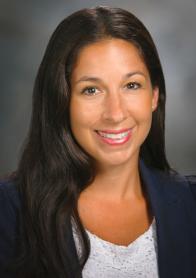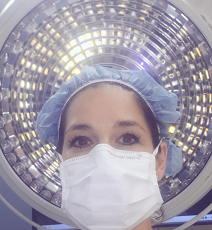ALERT!
This site is not optimized for Internet Explorer 8 (or older).
Please upgrade to a newer version of Internet Explorer or use an alternate browser such as Chrome or Firefox.
Featured Profile and Interview with Mara Antonoff, MD

Dr. Mara Antonoff is an Assistant Professor at the University of Texas MD Anderson Cancer Center in Houston, Texas, where she specializes in thoracic surgical oncology. Dr. Antonoff received her MD from the University of Minnesota Medical School in 2004, did her residency in general surgery at the University of Minnesota, and completed her thoracic surgery fellowship at Washington University in St. Louis, Missouri. She has trained in all aspects of cardiothoracic disease, concentrating on thoracic oncology, lung transplantation, diseases of the foregut, and minimally invasive surgical therapies.
During her general surgery residency, Dr. Antonoff was also an active research fellow, completing a basic research fellowship and two surgical education research fellowships. Her interest in research continues to the present day with focuses on pulmonary metastatic disease and exploring the effect of a patient’s sex on their lung cancer prognosis and therapy. She is also the Associate Program Director for the UT MD Anderson Thoracic Surgery Residency Program, where she applies her interest in surgical education research toward improved curricular design and assessment tools in thoracic surgery.
As @maraantonoff on Twitter, Dr. Antonoff is an active ambassador for cardiothoracic surgery in general and for women in the specialty specifically. She is a member of The Society of Thoracic Surgeons and Women in Thoracic Surgery, and is CTSNet’s Associate Editor for Social Media.
Claire Vernon for CTSNet: How has the basic science and clinical research you’ve done shaped how you approach your clinical practice or your career path?
Dr. Mara Antonoff: In a practical sense, engaging in research has allowed me to acquire important skill sets to understand and critically analyze available evidence in my areas of interest. In the bigger picture, I truly believe that it is only by continuing to question our current treatment paradigms and seeking to understand the outcomes of the care that we provide, that we can feel confident we are offering patients the best available treatment options. We must strive for better evidence, better choices, and better outcomes for our patients and their families, and the only way to honestly do so is with research. It was important to me to find a job where I could practice in an environment that emphasizes the critical nature of research to innovative medical care.
CTSNet: You are very involved in surgical training and education. Are there any changes to cardiothoracic surgical training, implemented by you or by others, that have been particularly noteworthy or successful?
MA: Much like clinical care, I believe that we must continuously question our educational strategies and use evidence to support the changes that are made. In recent years, given the numerous changes in the training environment, a number of active leaders in thoracic surgical education have worked hard to develop innovative curricula, and it is of utmost importance that we engage in rigorous, high-quality educational research to examine the evidence for these curricular endeavors. Surgical education research has come a long way in the last couple of decades, and it’s imperative that we continue to apply rigorous analyses and critiques to educational ideas, just as we would for clinical innovations.
CTSNet: You have an active Twitter presence—what do you find most useful about connecting with the cardiothoracic surgery community on that platform?
MA: Engagement in discussions via Twitter allows conversations with a breadth of participants and key stakeholders worldwide. If I want to discuss key topics in lung cancer care, for example, Twitter provides me with a venue to communicate—both synchronously and asynchronously—with thoracic surgeons around the globe, as well as with patients, their families, patient advocacy groups, basic scientists, trainees, and clinicians in a number of fields, including pulmonology, medical oncology, radiation oncology, pathology, diagnostic radiology, and primary care. The reach is remarkable, and it allows for true community participation.

Dr. Antonoff's photo for the #NYerORCoverChallenge.
CTSNet: Can you comment on the importance of social media movements, such as #ILookLikeASurgeon, for connecting young people and trainees with established surgeon role models?
MA: While social media is one way for us to connect with other clinicians, patients, and the public regarding our clinical areas of interest, it is also an avenue for impacting perceptions of who we are as CT surgeons. Movements such as #ILookLikeASurgeon and the #NYerORCoverChallenge are instrumental in shaping the way that the public perceives surgeons, and they are critical in influencing the careers considered by students and trainees.
CTSNet: What is your favorite thing about CTSNet?
MA: CTSNet has a number of outstanding features that are very useful and attractive to me as a CT surgeon. The videos and articles are all incredibly relevant; however, the most helpful aspects to me are the connectivity provided to other surgeons and the ease of accessibility to other CTSNet members.




